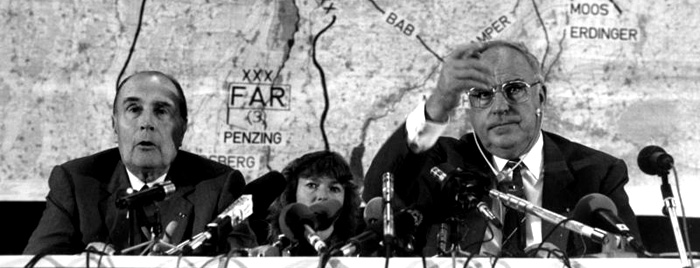It seems it’s the season for high level German politicians of yesteryear to have a go at the EU. Former Bundeskanzler Schmidt is quoted by Euractiv.de (Google translation here) as saying:
Es ist im Augenblick keine Führungsperson da. Das ist eine schlimmere Situation, als wir sie jemals in 60 Jahren der europäischen Integration erlebt haben.
The gist is that at the moment there is no leading person there (in the EU), and that it’s a worse situation that we have seen in 60 years of European integration. Schmidt also goes on to have a rant at the whole enlargement of the EU.
Former foreign minister Joschka Fischer also has a go (as covered by Kosmopolit, Google translation here), although his focus is more on how he sees Germany as a brake on European integration at the moment, different to Germany’s traditional role as a motor for integration.
Broadly I agree with the statements of Schmidt and Fischer. But why is it so? It’s all very well for them to decry the demise of EU leadership, but what are we going to do in the future to address the situation while Fischer and Schmidt enjoy their pensions.
In the end leadership at European level emerges when there is visionary, determined and long term leadership at national level in the Member States. When leaders behave like states(wo)men, realising something needs to be sacrificed nationally for the sake of the future of the continent. Leaders who see the national interest and the European interest as being one and the same thing, and do not hesitate to communicate as such.

The problem is that in the era of 24/7 news, the internet, fracturing party political systems, demographic issues, decreasing election turnout and decreasing trust for elected politicians how can such leaders emerge? Would people like Genscher, Kohl, Mitterand, Palme even become leaders of their respective parties in the political environment we face today?
Can you imagine Merkel and Sarkozy holding hands at Verdun? Probably not.
It strikes me that party politics is in a dangerous predicament in many EU Member States, with prevalent poor quality leadership, and short-termist populism as a result of thinking about short term strategic advantage rather than longer term thinking.
So that’s the start of answering why. Then comes the much harder question what do we do about it?
I don’t think what’s needed are national sacrifices in negotiations. And I got the cynical impression that especially Germany seems inclined to call for ‘strong leaders’.
However, the question is: What type of leader are we looking for?
I agree that we need visionaries and leaders to facilitate better negotiations and present the process better in public. But do we need a brawny type of leader for that? Isn’t there a lack for some sort of charisma?
See also: “The time for great leaders is over” – http://www.europeandme.eu/7brain/422-alas-europe-great-leaders
I wonder if the germans themselves are not an obstacle to EU leadership, if the leader is not german. Also, there are now so many “top”leaders of Europe, that current people doesn’t even know well what is the power of each (Van Rompuy, Barroso, the EU trio of prime ministers, and Ashton). There cannot be a caesar when there is a multivirate (in analogy with the roman triumvirates). Should the leader come from an EU country that looks more to the USA than to Europe and/or has not adopted the euro? As things are as now, with 27 Member States and too many national interests, I feel that through leadership is very difficult. First of all the people and the politicians should be first convinced to be real Europeans.